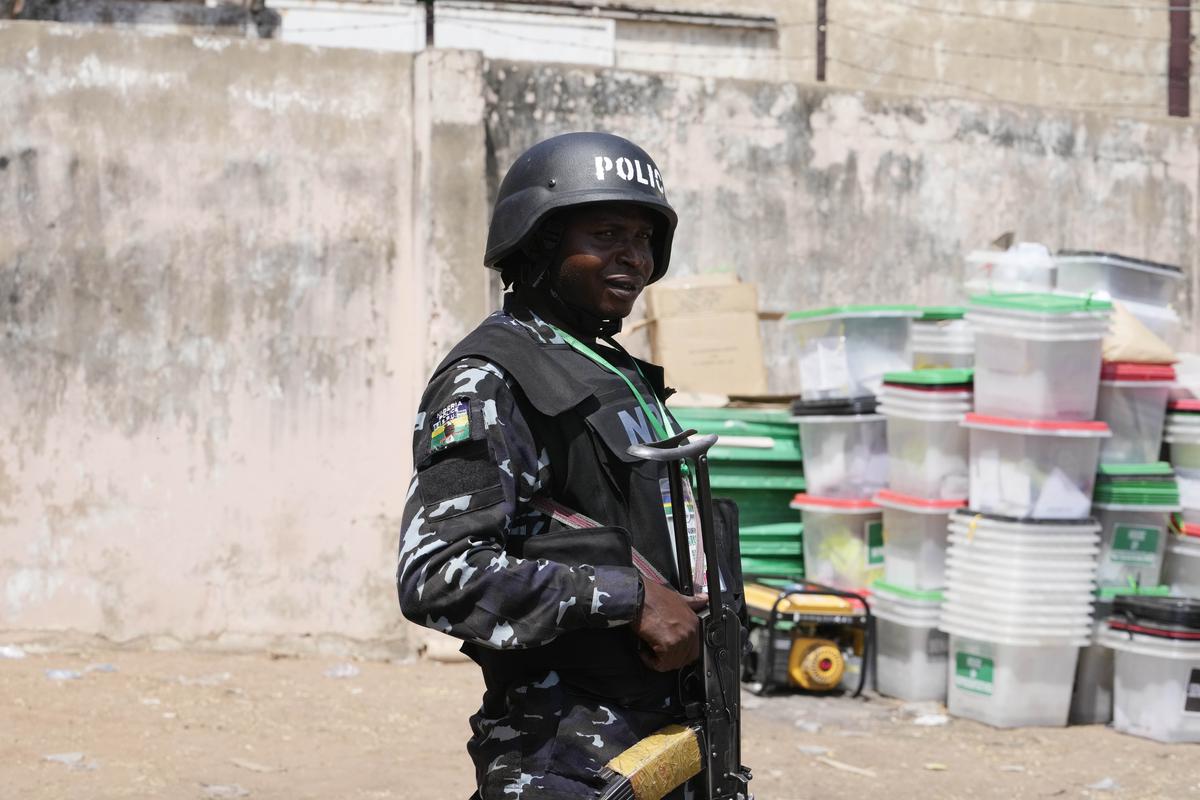On Election Day last week, the Nigeria police had what is arguably their finest hour in policing in living memory, and for distinctly Nigerian institution that never gets anyone’s praise, I cannot hesitate to congratulate the Inspector General of Police, Usman Alkali Baba, for the excellent outing by his men and women on Saturday. From the most senior officers to the rank and file, the police did Nigeria proud by their numbers, their conduct and their communication all through their deployment at checkpoints and polling units throughout the country.
Nigerians noticed, and praised the police for it. Across many states, voters told Daily Trust reporters that they were impressed by the conduct of the police during the election. As a Lagos voter, Taiwo Oluniyi put it, “Policemen on election duty behaved themselves. The only disadvantage was that they were not armed and as a result, most voters did not respect their directive”. Of course, there was an incident in Rivers State were policemen reportedly beat up a journalist and confiscated his camera, before releasing him on the orders of their superiors.
But what can we make of all these for police-citizen relationships in Nigeria over the long term? The policing outfit of every country exists to provide protection to the citizens, even if, as is often necessary, they are part of the repressive state apparatus with which the state maintains control over citizens and therefore entrench the status quo. For all the talk about democracy and freedom in Europe and the United States, for example, their police organizations are not to be trifled with by any group of citizens seeking to challenge the current order in any significant way. But while in many of such countries, the protection role of the police supersedes its control functions most of the time, in Nigeria, the control function is evident everywhere, but not so the protection work. When last does anyone feels protected by seeing the police at a checkpoint or in the neigbourhood late at night?
The relationship between Nigerians and the police has always been one of two: transactional or repressive, depending on the context. When on direct state engagement against the democratic impulses of Nigerians, such as during conflicts, protests or elections, the police tend to be generally oppressive, beating up or locking up citizens at will. This is the control mode virtually all Nigerian policemen and women understand. In the vast majority of the individual everyday relationships between Nigerians and the police, however, the dominant form of conduct is transactional: individual policemen, and often, whole police units, collect money from citizens in exchange for bending the rules or looking the other way.
Of course, the transactional dimensions of police-citizen relations is also repressive. Citizens that have more money, more family name or prestige, and more connections to power get the protection of the police against those who do not. Thousands and thousands of Nigerians ever arrested, detained in police cells or beaten up by police were in these situations mainly because they had no money, knew no one in power or had little or no education to bluff their way through, like most of the middleclass Nigerians do. The Nigerian police is the supreme enemy of the common man in Nigeria. Yet, it is this dominant attitude to citizen-police relations that somehow miraculously disappeared among our policemen and women on duty last Saturday. And while it may be for just one day, it is commendable still. And above all, it points the way to a new model of relations for the citizen and the uniformed in Nigeria.
The police are just one of several institutions that had a duty to Nigerians and our democracy last Saturday; the media are another. The media’s first role in a democracy is to work to advance democracy itself. How did the media, particularly the legacy media, perform on this rather straightforward function during the elections last week? For answers, look no further than the front-page headlines of the major newspapers by yesterday morning. Newspaper front pages mirror not just the editorial instincts of papers’ editors and even ownership, but also the expectations of its readers on issues in society, particularly during an election. It matters for our immediate political stability what frame and imagery newspapers use to report an election whose results has yet to be announced in so fragile a system such as ours.
“KILLINGS, BVAS, BALLOT BOX SNATCHING MAR POLLS” screamed the Punch, the self-acclaimed “most widely read newspaper in Nigeria”. This was the crudest of all the headlines yesterday morning, but it was not alone. “OBI SHOWS STRONG STRENGHT IN LAGOS, S’EAST, S’SOUTH, OTHERS” predicted the Sun rather broadly. “Tinubu ahead in Southwest, Northwest, North-Central” countered the Nation. Vanguard is a little shy of its own convictions for toeing the path beaten by Punch, with, “Tinubu, Atiku, Obi upbeat as violence, late arrival of materials mar polls”. Leadership, whose heart now lies away from its mouth, editorialized its front page as “Bruised But Unbowed”.
All these headlines, in their own different ways, and deliberately or inadvertently, are doing the same thing: seeking to discredit the election entirely and hence to cause confusion, whether people are aware of it or not. We can excuse the linguistic immaturity of “strong strength” in the Sun’s headline but the import of the story overall is inexcusable, namely, that one of the candidates is on the way to victory, even though no official state-wide results had been announced by the only body with the mandate to do so—INEC. The Nation does the same from the opposite direction. But both papers must know that to prime their readers to expect victory for certain candidates without the solid facts from INEC portends nothing but danger.
But the Punch is in a different league of a destructive political journalism all its own. First, it uses a black background—as in a funeral, death or destruction—to cast a headline that ominously seeks to dismiss and discredit the whole election process, even before it is completed. Journalism is a profession of judgment and decision about news. But at the heart of all judgements, in the newsroom or courtroom, is a sense of proportion. By how much is the negative in relation to the positive? In how many places were there instances of “killings”, BVAS issues, and “ballot snatching” out of the total 176,846 polling units where INEC conducted elections in the country?
No one knows the total number of incidents yet across all the 36 states, but it is very doubtful that they are up to 1000 cases, which would be less than 1% (one percent) of all the polling units (1,768) in the country where elections took place peacefully without any incidence. How can a newspaper report a story from the perspective of less than one percent because it is negative and then ignore the remaining 99% that is factually positive?
Yet, it is this line of reporting, this less than 1% of negativity, that is the story of this election in our media so far. It is being repeated on TV and on social media, and has since taken a life of its own. Soon we will have a narrative of the election that is vastly different from the reality of it, and your guess is as good as mine where that will lead. I can only hope Nigerians will not allow it.

 Join Daily Trust WhatsApp Community For Quick Access To News and Happenings Around You.
Join Daily Trust WhatsApp Community For Quick Access To News and Happenings Around You.


